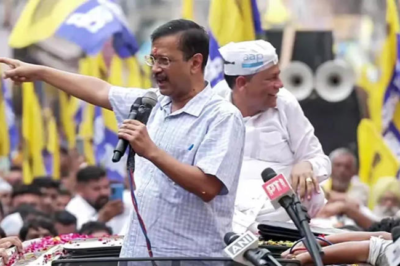
- AAP leader Arvind Kejriwal attacks PM Modi, posing five questions to RSS chief Mohan Bhagwat.
- Kejriwal’s strategy implies the RSS controls the BJP, diminishing Modi’s stature.
- The former Delhi Chief Minister rallies supporters, urging them to decide if he’s a “thief” or a victim of political vendetta.
How is Kejriwal’s latest strategy playing out in India’s political landscape?
In a bold political move, Arvind Kejriwal, leader of the Aam Aadmi Party (AAP), has intensified his offensive against Prime Minister Narendra Modi and the BJP by demanding answers from the Rashtriya Swayamsevak Sangh (RSS) chief Mohan Bhagwat. Kejriwal’s new approach aims to challenge Modi’s authority, hinting that the RSS, as the ideological parent of the BJP, should step in to control its “child” — a clear attempt to show Modi as subservient to the RSS.
Speaking at his rally at Jantar Mantar, Kejriwal posed five pointed questions to Bhagwat, which primarily revolved around BJP’s political ethics and actions. His questions, while politically strategic, brought a new dimension to his narrative by implicating Bhagwat and the RSS in the functioning of the Modi government.
Kejriwal’s 5 Questions to Mohan Bhagwat:
- Central agencies and political disruption: Kejriwal questioned whether the RSS agreed with the BJP’s alleged use of central agencies like the CBI and ED to break apart opposition parties and topple governments. His focus on this issue comes in light of recent political developments where opposition leaders have accused the BJP of using federal agencies to stifle dissent.
- Retirement age for leaders: Kejriwal raised an age-related query, asking if the RSS-backed BJP would implement its retirement rule for Modi, just as it did for former party patriarch LK Advani. This question touched on the broader debate within the BJP regarding its leadership transition and generational shift.
- Induction of corrupt leaders: He challenged Bhagwat by asking if the RSS agreed with the BJP’s practice of labeling opposition politicians as “corrupt” only to later induct them into its ranks. The question aimed at exposing an inconsistency in the BJP’s rhetoric on corruption.
- BJP’s independence from the RSS: Kejriwal pointedly asked Bhagwat how he felt about BJP president JP Nadda’s recent statement that the party did not need the RSS. By raising this, Kejriwal sought to exploit potential tensions between the BJP and its ideological mentor, RSS.
- BJP’s future without RSS: Kejriwal asked if the BJP could sustain itself without the RSS’s support, further underlining the idea that Modi’s government relies heavily on the RSS’s backing for its legitimacy.
Political Theatre at Jantar Mantar
Amid the rally, Kejriwal’s supporters, clad in AAP’s signature blue and yellow, filled Jantar Mantar with slogans of support. The atmosphere was charged with chants like “Na rukega, na jhukega…” (“He will neither stop nor bow”), reinforcing Kejriwal’s image as a defiant leader standing against the BJP’s powerful machinery. Many of his supporters held banners affirming his innocence, calling him “imaandar” (honest), emphasizing their belief that the corruption allegations against him were politically motivated.
Kejriwal, who was recently released on bail after over five months in Tihar jail on corruption charges related to the Delhi excise policy case, maintained his stance of innocence. He reiterated that his entry into politics was not for personal gain but to serve the nation. His emotional appeal to the crowd underscored his narrative that the allegations against him were a part of a larger conspiracy.
A Shift in Kejriwal’s Political Strategy
By directly addressing the RSS chief and questioning the BJP’s internal dynamics, Kejriwal has introduced a new element to his political strategy. His focus on Bhagwat, rather than just Modi, signals a calculated attempt to undermine the BJP’s ideological foundation. It also reflects his effort to realign his image post-incarceration, projecting himself as an unwavering and honest leader being persecuted by corrupt systems.
Kejriwal’s strategy of addressing these issues ahead of the Delhi Assembly elections frames the upcoming poll as a personal test — a metaphorical “trial by fire” — urging the people of Delhi to decide whether they believe the corruption charges against him. He even stated that if the public perceives him as dishonest, they should not vote for him.
Conclusion: Is Kejriwal positioning himself as a martyr or a master tactician?
Arvind Kejriwal’s latest political strategy, by involving the RSS in his critique of Modi’s government, reveals an attempt to position himself as both a victim of political vendetta and a master tactician exposing the BJP’s contradictions. Whether this will resonate with voters in Delhi and across India remains to be seen, but Kejriwal’s narrative is undoubtedly stirring conversations ahead of the elections.








































Leave a Reply